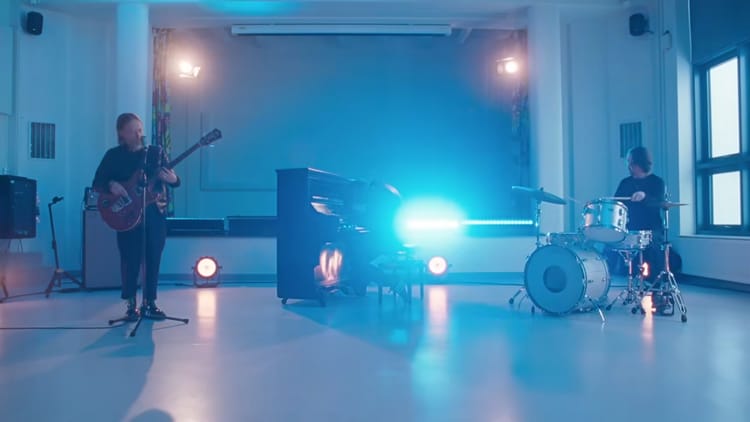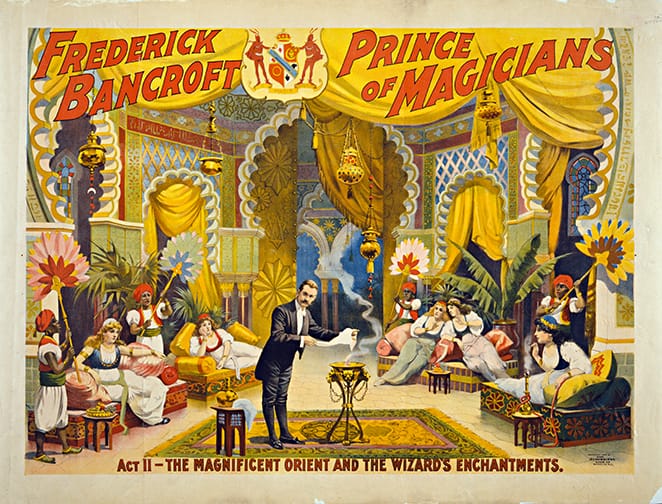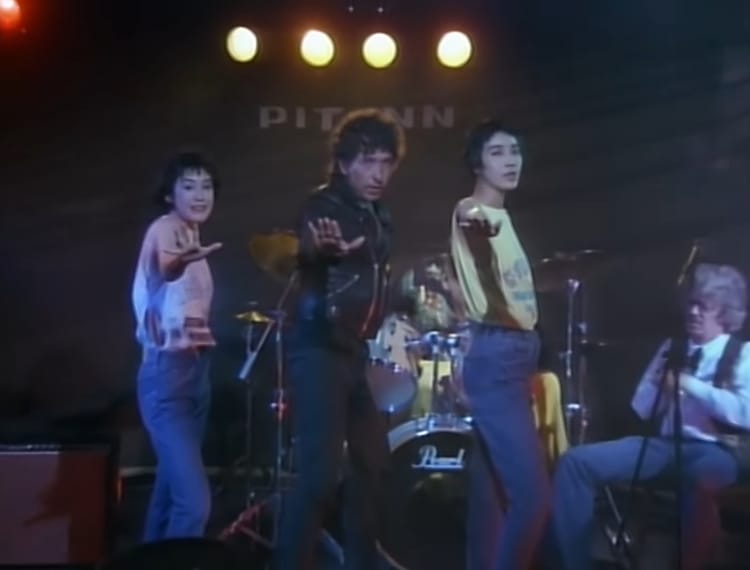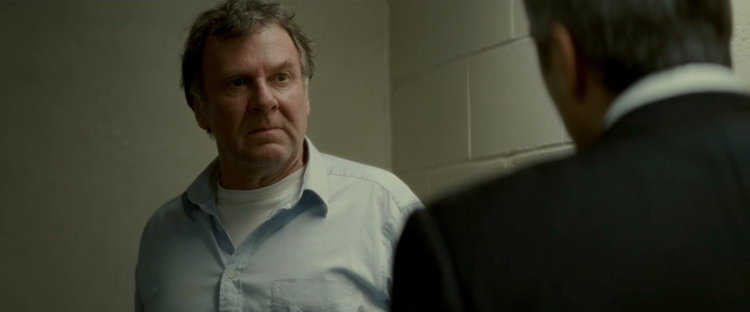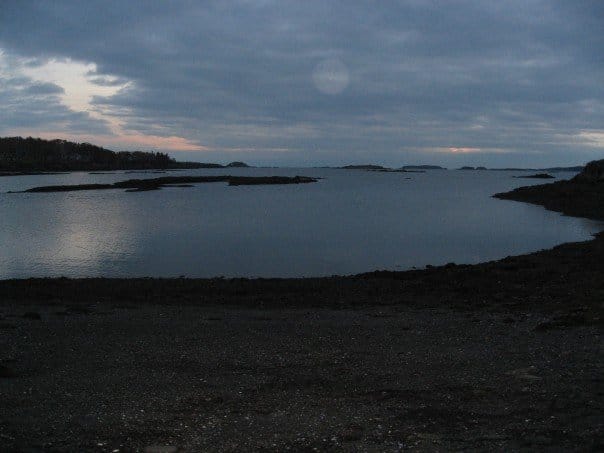A Few Notes on "The Last Waltz"
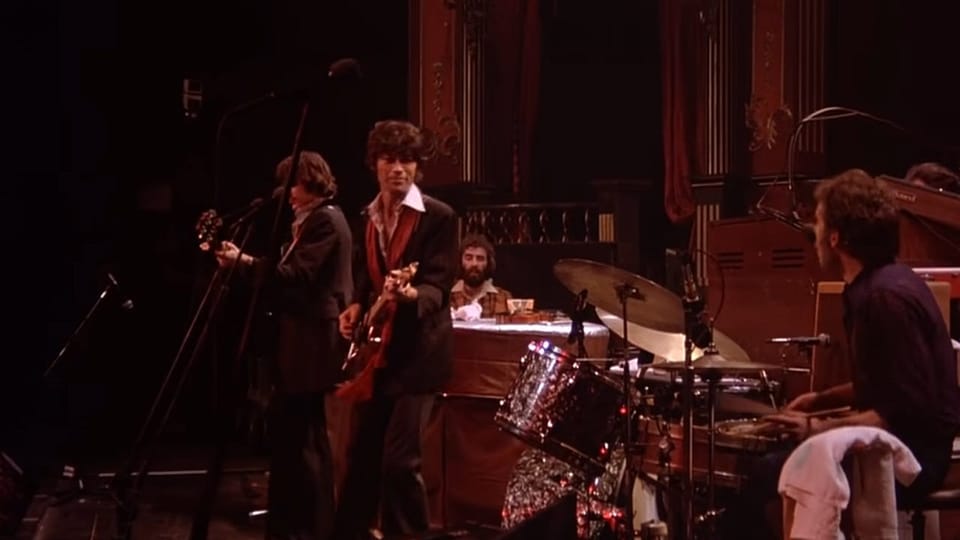
My schedule hasn’t allowed for many critics’ screenings recently, but I don’t want to leave my beloved subscribers high and dry for too long. So for want of a new release to pass judgment on, I’m here this week to celebrate the movie that’s defining my November, and maybe the rest of my life.
I’ve been working on my first piece for the Los Angeles Review of Books, which involves reviewing both the forthcoming Rags and Bones: An Exploration of The Band and this year’s Criterion remaster of The Last Waltz, Martin Scorsese’s ultra-classic 1978 concert film documenting the last show of the Band’s original lineup. Here’s the thing, though, and this is just between you and me: before last week, I had never seen The Last Waltz and had only the most cursory familiarity with the Band.
One thing I did know was that they backed up Bob Dylan during one of the most artistically fruitful periods of his career, and based on their presence in Dylan’s little-seen directorial effort Eat the Document, I was starting to form an awareness of Robbie Robertson (seen clinging to Bob like the eternal opportunist he seems to be) and Richard Manuel (seen trying to buy a young English man’s girlfriend for the price of whatever belongings he has on him, plus some Australian cash). But I’ve also known for a while that, due to my contractually-bound responsibility to write a book on Bob Dylan, it would behoove me to know more about the Band. So when I saw Rags and Bones on the University Press of Mississippi website, I jumped on the opportunity to turn my edification into an assignment.
I won’t get into my feelings on Rags and Bones, nor The Last Waltz’s remaster and new special features; that’s for later. What I will say is that I have experienced a transcendent, love-at-first-sight connection with The Last Waltz, something I’ve always known was probably destined to happen at some point in my life, but which I never bothered to make much of a stab at. This must have been the appointed time, though, because I have watched The Last Waltz four times in the past week, probably twice as many as necessary to effectively write my review. I can’t stop. All I want is to live in the world as soundtracked by the Band and engineered by Marty.
The Last Waltz would have you believe that leaving the road was a mutual decision, but that seems to have been very much not the case. The Band’s lead songwriter and guitarist, Robbie Robertson, looked at the risky excesses his bandmates were falling prey to on the road, and made the decision to try and transition the Band into a recording outfit rather than a touring one. Thing is, though, that decision was unilateral rather than collaborative (the way the Band’s working relationship is said to have been from the beginning), and singer/drummer Levon Helm, in particular, strenuously objected to everything about the arrangement, including making The Last Waltz.
This awareness—that one of Robertson’s ostensible brothers begged him to at least let the others retain the name and continue touring, only for Robbie to coldly threaten him with legal action—has turned The Last Waltz into a serious tearjerker for me. Scorsese’s most potent decision is to open the film with the night’s final performance, “Don’t Do It” (a cover that had worked its way as indelibly into their repertoire as their originals), and so provides the opening titles over the last song this version of the Band would ever play together. Robbie grabs the mic before and after the song (save for Rick Danko’s exhausted-bemused “Happy Thanksgiving,” shouted to a crowd still assembled at 2:00 the morning after the holiday), but the song belongs to Levon, who roars into the mic from behind his drum kit, not an ounce of tiredness perceptible in his performance. The last song the Band ever played was one of the most captivating rock performances I’ve ever seen. They quit at the absolute top of their game as live performers, and Levon didn’t want to. I get misty every time I reach that point in the 54-track 40th anniversary soundtrack, which I’ve been listening to pretty much all the time this past week.
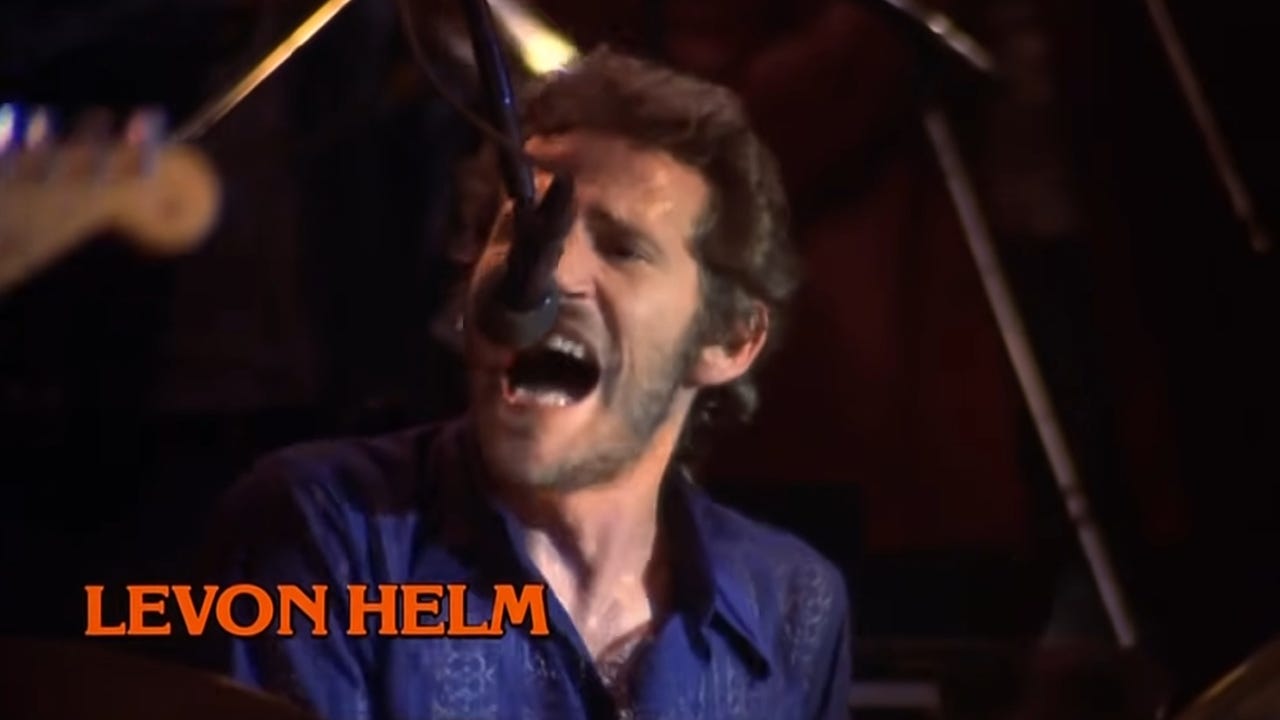
My six year old likes to hear about what I’m working on, so over the weekend, I told her the story of Robbie and Levon—with my version certainly biased towards Levon’s telling—and she has declared herself a fierce enemy of Robbie; “I think he’s a real stinker,” she announced at dinner on Monday night. Robbie does seem to have been a bit of a stinker, particularly in his notorious efforts to secure as much financial stake as possible in the Band’s legacy. But he also seems to have been the member with the strongest survival instinct—Levon’s story may be sympathetic in many respects, but the passages involving showing up to the studio on heroin and nodding off behind the drums, as well as almost killing Robbie’s wife while driving drunk, aren’t exactly endearing—and, indeed, as of now, Robbie is one of the last two surviving members. But as the late Levon is meant to have snapped at him during their acrimonious breakup, “I’m not in it for my health.” What a line. What a performer.
I’ll admit, I lose a little bit of my buzz as The Last Waltz goes along; there’s just no way to sustain the sublime run that is “Don’t Do It,” the loop back around to opening number “Up on Cripple Creek,” and the subsequent transition into “The Shape I’m In,” one of Robertson’s various anthems of touring exhaustion. Don’t get me wrong, every second of this movie electrifies me (let’s not leave a soul-pummeling “The Night They Drove Old Dixie Down” unmentioned, nor special guest Van Morrison’s chest-baring high kicks), but that opening 15 minutes is just off the charts. And the moment it peaks is during Richard Manuel’s title card.
I had known the name Richard Manuel since long before I knew the rest of the Band’s names due to his being referenced in the 2002 Counting Crows track “If I Could Give All My Love (Richard Manuel is Dead).” I wasn’t aware of the circumstances of his death until watching the (fascinating, if Robertson-biased) 2019 documentary Once Were Brothers: Robbie Robertson and The Band, and I won’t rehash those tragic details here. They’re available, and they’re terrible. What I will talk about is this: Richard’s title card comes third, after Robbie and Rick but before Levon and Garth. Scorsese’s team picked the perfect time to cut to Richard—at this point looking more Sasquatch than man—as he hits a piano chord, shifts his shoulders, and grins at his friends. Rarely have I seen such a beautiful grace note of performance captured onscreen, let alone in 35mm closeup, and it’s a gasp-worthy moment every time I see it. It’s tempting to retroactively declare Richard the raw heart of the group; it’s terribly narratively convenient. So maybe that’s what I lapse into by adoring this moment of film. But film can tell us stories that aren’t necessarily beholden to the troublesome responsibility of fact, and in Richard Manuel’s shoulder shift, I see a beautiful soul taking pleasure in what he was meant to do.
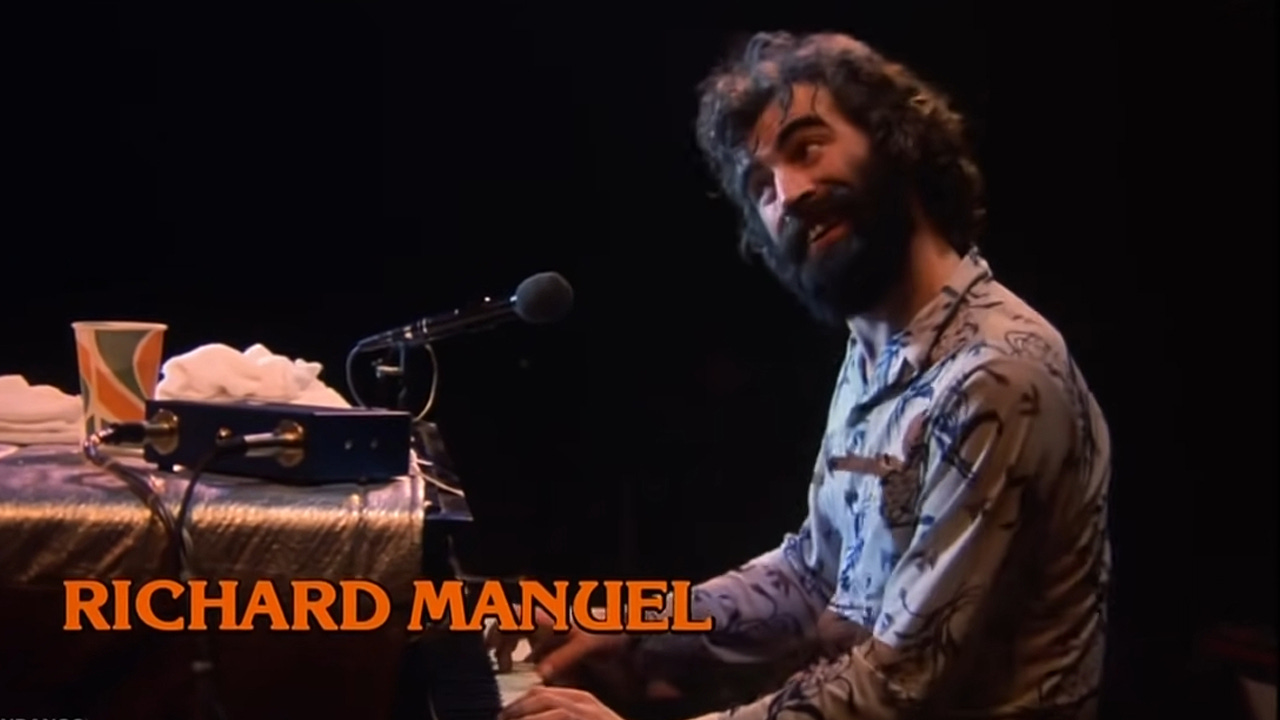
What a story this band tells; their trajectory seems to represent rock music in microcosm, from humble bar-band beginnings to arenas and back to bars again, along with all the sex and drugs that are said to be part and parcel with rock and roll. The Last Waltz makes a pretty powerful case that if you only need one rock band, you need the Band. It took me a while to get around to hearing that argument, but it’s persuaded me.
As is so often the case, Frank Falisi put it best in his own review of The Last Waltz: “this is my favorite slice of not-dying captured in air wobbles and body smoke.” What a line. What a movie.
No sundry ephemera this week—it would all be Band albums and Band YouTube videos and books about the Band (but seriously, the part about them in Greil Marcus’ Mystery Train - no, sorry, I’ll stop). Come back next week for a review of Ryan Reynolds and Will Ferrell in the Apple+ Christmas original Spirited. I’m sure I’ll feel just as strongly about that one as I do about The Last Waltz.
